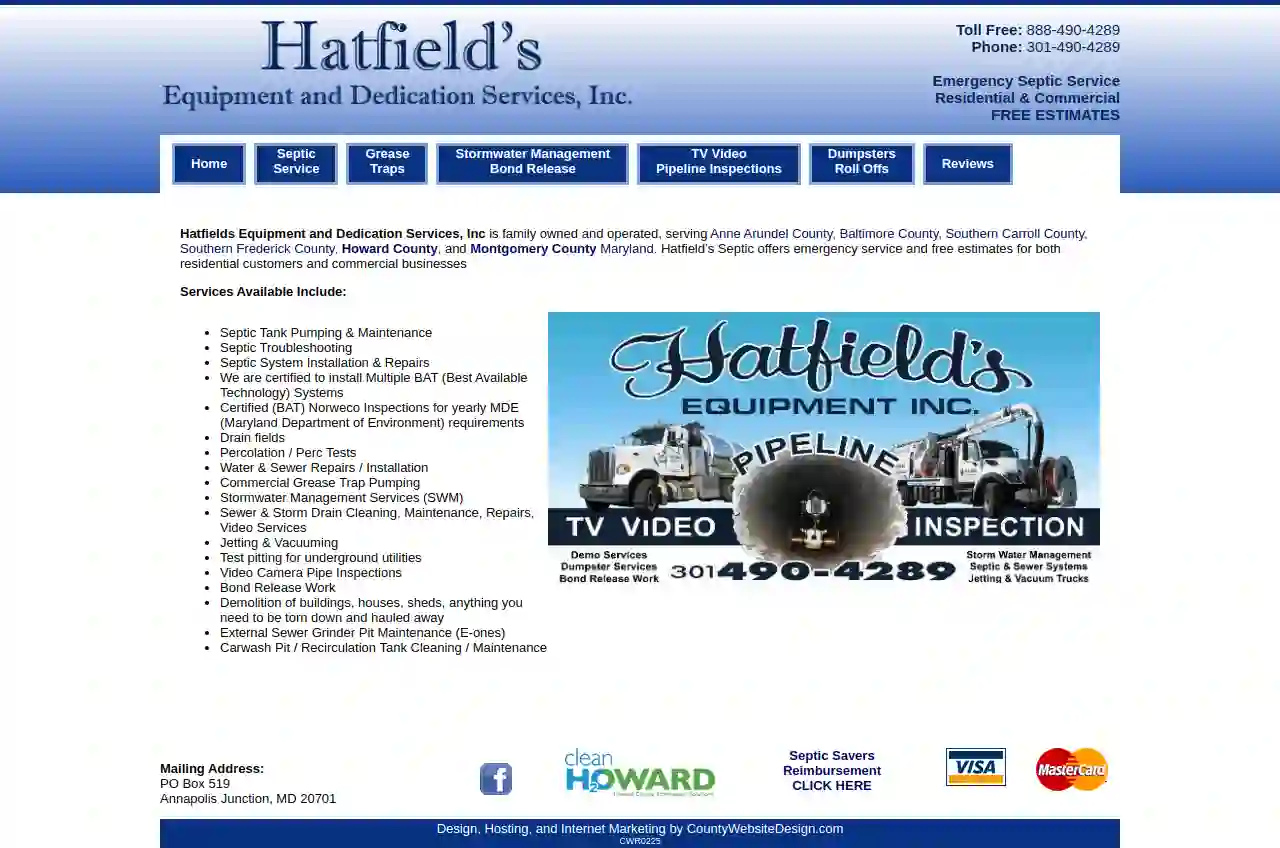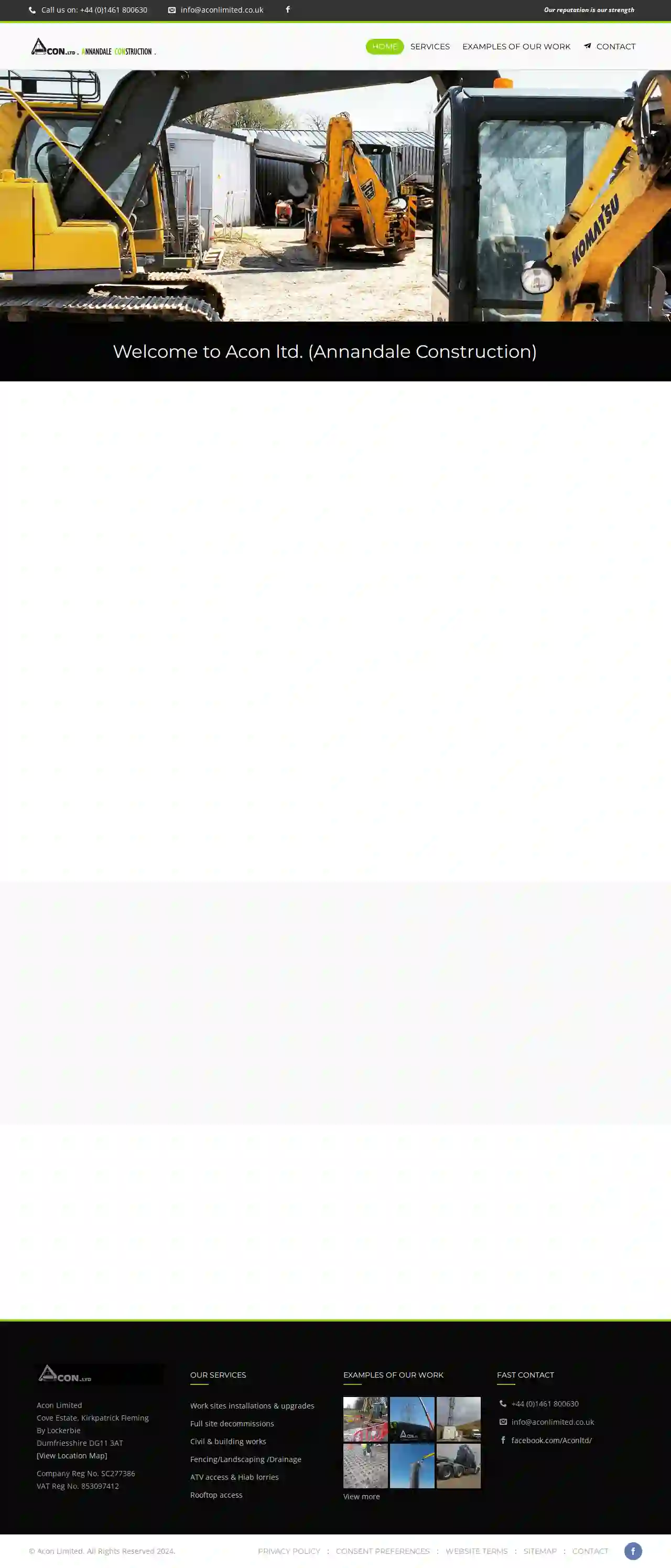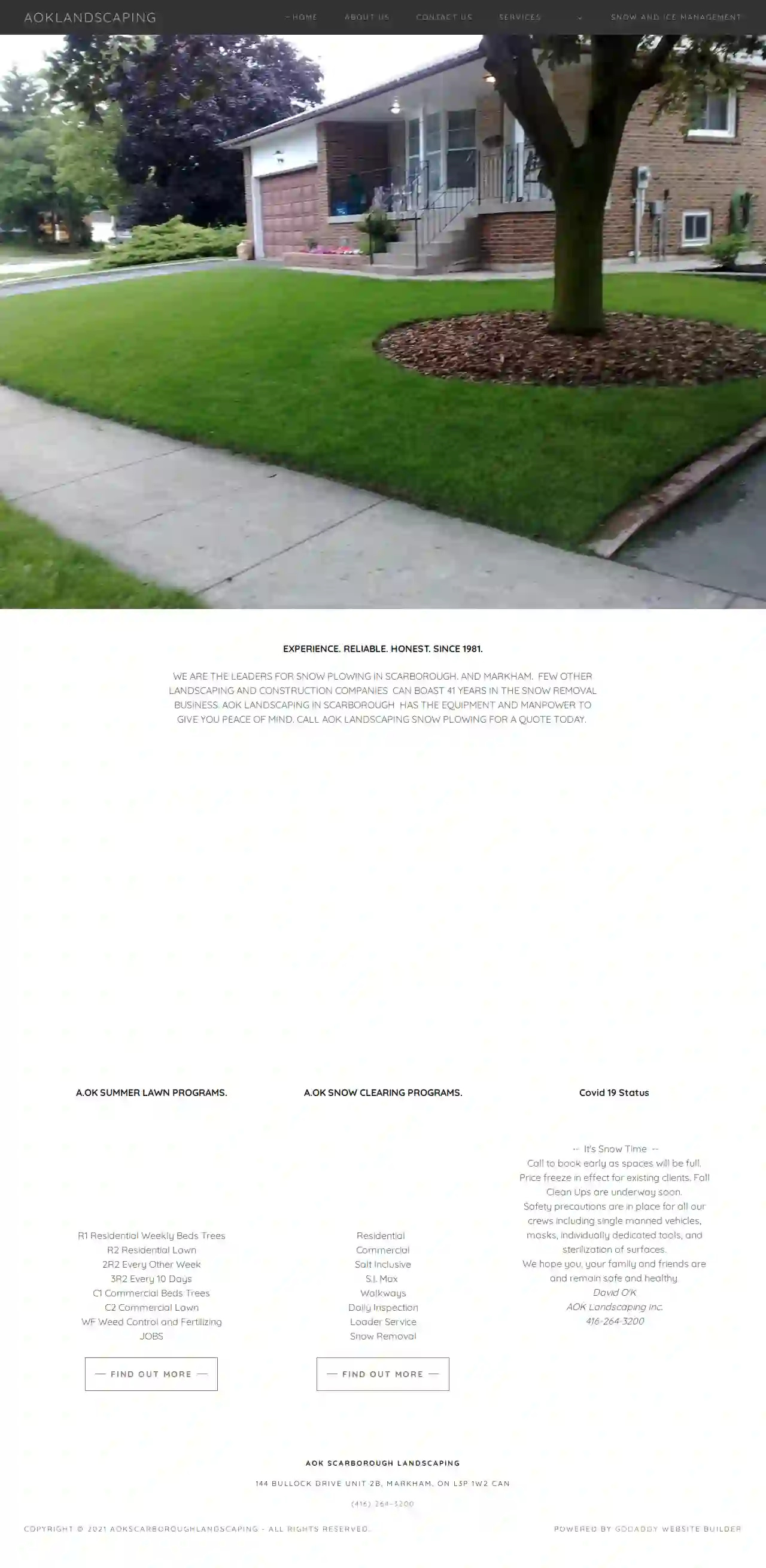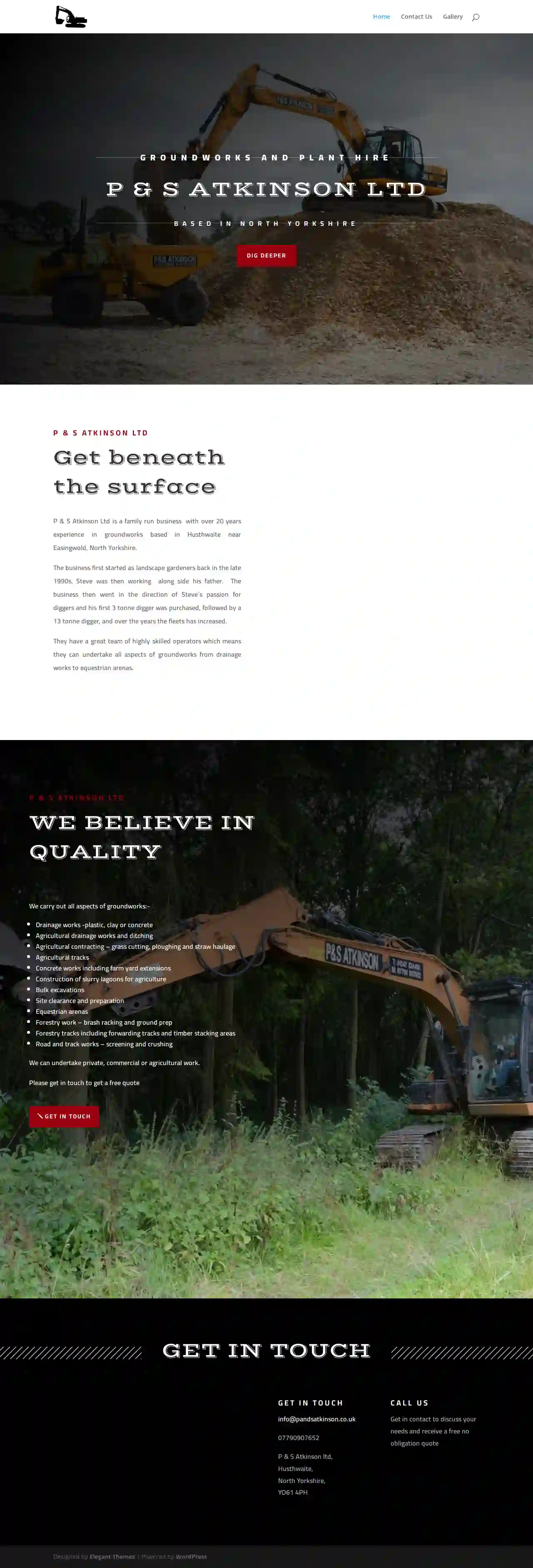Excavation Contractors Hessle
Find the best Excavation Contractor in Hessle
Get up to 3 Land Excavation quotes for your project today! Compare profiles, reviews, accreditations, portfolio, etc... and choose the best deal.

LC Plant Services LTD - Mobile Plant & Forklift Truck Repair
3.73 reviewsUnit 3PKP Trading Estate, Carr Wood Road, Unit 3PKP Trading EstateCarr Wood RoadCastleford West Yorkshire, Castleford, WF10 4SB, GBAbout LC Plant Services Ltd. Founded in 2014, LC Plant Services Ltd has become a strong team within the Construction Plant, Machinery & Material Handler sector. With our dedicated office & service team, we can assist you with all your machinery repair requirements. From site breakdowns to major overhauls, we can carry out anything you may require. We offer a dealership level of service, providing diagnostics, repairs, and honest advice across Yorkshire and the UK. We are Yorkshire's No. 1 choice for all Mobile & Construction Plant Machinery Repair & Maintenance with National coverage due to our ever-growing fleet of Service Engineers! LC Plant Services Ltd is a fully independent, professional mobile plant machinery, Quarry plant machinery, Construction plant, forklift truck & static plant maintenance repair & service company. We offer our customers a full-rounded service for all plant & machinery needs, from interim inspections, servicing, repairs, LOLER / PUWER Examinations, transport and plant hire, all at competitive prices. Based in Pontefract West Yorkshire, we offer reliable effective breakdown & major repair & servicing solutions throughout the Yorkshire & The Humber regions to all brands & models of 360 & 180 degree Excavators, Mini Diggers, Dumpers, Rollers, Loading shovels, Skidsteer loaders, Forklift trucks, Generators, Compressors & any other powered hydraulic equipment. Diesel engine diagnosis & repair specialist & auto electrics carried out. We can offer state-of-the-art Diagnostics + Remapping services to increase power levels & more. Our high level of experience guarantees customers minimal downtime due to our extensive knowledge of all aspects of machinery component diagnosis and repair. Fully LEEA accredited to carry out on-site Loler/Puwer thorough examinations to mobile plant, forklift trucks, HIABS, cranes, lifting equipment & static plant. Plant machinery & forklift truck transport specialists. Local or nationwide, site moves, machine recovery, general transport, please contact us for a competitive quote.
- Services
- Why Us?
- Accreditations
- Our Team
- Gallery
Get Quote
K W Timmins & Sons Ltd
The Cottage, Tillbridge Lane, Sturton By Stow, LN1 2BP, GBFamily-run in Lincolnshire Since 1975 Timmins & Sons: established Groundworks & Agricultural Contractors We work with commercial & domestic customers within 50 miles of Lincoln. Explore how we help: I’m looking for a groundworks company Discover Service » I’m looking for an agricultural contractor Discover Service » I need land maintaining & looking after Discover Service » I’m looking for operated plant hire Discover Service » "Quality build and great team of lads" Ken Martin We're one of the only agricultural contractors in the area to offer... Forestry Mulching View Service Concrete Crushing & Screening View Service Discover some of the reasons our customers love to work with us: Local Contracting & Plant Hire Reliable & Trustworthy Adheres to Time Scales Get the job done right With over 35 years of dedicated construction groundwork and agricultural services. The Timmins family has been a dedicated agricultural contractor and plant hire service provider since 1975. Our values are the same today as they were over 35 years ago – a commitment to providing excellent agricultural and construction groundworks, underground irrigation works, farm contracting, operated plant hire, land maintenance, machinery and equestrian groundworks. Need a contractor to offer you a one-stop service? K W Timmins can offer the full works, from bespoke fabrication, agricultural contracting, groundworks, plant hire, and maintenance services - we can do the whole thing. Let us help your business run smoothly, we work hard to meet all your expectations and ensure everything is delivered to specifications and on time! About KW Timmins > Groundwork Services in Lincolnshire Need to prepare your site? We provide groundworks for commercial and industrial construction projects including foundations, site preparation, drainage and sewage. Concrete Crushing & Screening Discover Service » Full Screening Discover Service » Forestry Mulching Discover Service » Laser Screed Concrete Discover Service » Drainage Discover Service » Utility Cable & Water Pipe Laying Discover Service » Underground Irrigation Systems Discover Service » Site Clearance & Preparation Discover Service » operated plant hire We offer a comprehensive range of modern plant operated by our skilled and experienced workforce for all your plant hire needs. Tracked Jaw Concrete & Stone Crusher Extec & Sandvik Tracked 3way Split Screen Machine Tractor and Mulch/Flail Mowers Caterpillar, Hitachi and Bobcat 360 Tracked Excavators Vermeer 5750 4 Wheel Drive Trencher Terex, Thwaite
- Services
- Why Us?
- Testimonials
- Gallery
Get Quote
Maine Commercial Contracting
52 reviews36 Curtis Farm Road, Buxton, 04093, GBMaine Commercial Contracting At Maine Commercial Contracting, we provide a wide array of contracting services at competitive prices. We believe the best way to succeed and grow is to help you succeed and grow. Any Project Size, Any Personal Touch. We have an established tradition of delivering the finest quality craftmanship by employing and training hard working individuals with an attention to detail and an appetite for excellence. We maintain an high regard to our clients’ budgets and timelines, which shows in our positive relationships with those who contract with us. Maine Commercial Contracting is a full service excavating and grading contractor located in Southern Maine, serving the entire New England area. Your business needs to be accessible during hours of operation. In New England, this means needing reliable snow removal services any time day or night to make sure your lots are clear and your business is open and busy. Maine Commercial Contracting has installed hundreds of custom residentail asphalt driveways throughout the state of Maine and New England area. While retaining walls look like simple stacked stones, blocks, or wood, they are actually carefully engineered structures that fight against gravity and the weathering elements. At least, the ones we build here at Maine Commercial Contracting are. Our specialized equipment will have your concrete shed pad installed in no time. We build solid foundations for your structures. Our specialized equipment will have your septic area dug out in no time. We work smart and hard to make sure the job is done right as well as timely. We have big equipment for your big or small project. Hire us for your small excavation and/or demolition needs to prep your site for the next great addition in your community. We take on a wide variety of industrial, commercial, and residential projects, which means we have the tools, team, talent, and experience to make it happen on time and in budget. Want something more durable than a dirt path? Maine Commercial Contracting provides an array of flatwork services to meet any size job and budget. We build bike trails, hiking trails, patios, driveways, and more.
- Services
- Why Us?
- Testimonials
- Gallery
Get Quote
Hatfield's Equipment & Dedication Services, Inc.
4.220 reviewsPO Box 519, Annapolis Junction, 20701, GBHatfields Equipment and Dedication Services, Inc Hatfields Equipment and Dedication Services, Inc is a family-owned and operated business serving Anne Arundel County, Baltimore County, Southern Carroll County, Southern Frederick County, Howard County, and Montgomery County Maryland. We offer emergency service and free estimates for both residential customers and commercial businesses. Our Services Hatfields Septic offers a wide range of services to meet your needs, including: Septic Tank Pumping & Maintenance Septic Troubleshooting Septic System Installation & Repairs Certified to install Multiple BAT (Best Available Technology) Systems Certified (BAT) Norweco Inspections for yearly MDE (Maryland Department of Environment) requirements Drain fields Percolation / Perc Tests Water & Sewer Repairs / Installation Commercial Grease Trap Pumping Stormwater Management Services (SWM) Sewer & Storm Drain Cleaning, Maintenance, Repairs, Video Services Jetting & Vacuuming Test pitting for underground utilities Video Camera Pipe Inspections Bond Release Work Demolition of buildings, houses, sheds, anything you need to be torn down and hauled away External Sewer Grinder Pit Maintenance (E-ones) Carwash Pit / Recirculation Tank Cleaning / Maintenance
- Services
- Why Us?
- Gallery
Get Quote
Aggregate Recycling (UK) Ltd
3.85 reviewsBack Road, Wilberfoss, York, YO41 4DD, GBAggregate Recycling UK operate a fully licensed Inert Landfill, Aggregate Recycling and Treatment Facility within North Yorkshire. Based near York we have one of the largest clay pits in the area, supplying clay for all your engineering and domestic needs. We operate a modern fleet of 8 Wheeler Tippers and Grab Wagons, available for undertaking bulk and one off muck away projects. Aggregate Recycling can supply and deliver clean and recycled aggregates, sand and top soil and provide a means for crushing and screening of your demolition and excavation wastes. Contact us today with your enquiries. We Supply Supplying The Following Aggregates: Quarried & Recycled Stone - We supply Type 1 Stone 10/20/40mm Clean Stone Topsoil, Fill Sand, Building Sand Road Planings Asphalt Plants on site producing Tarmac base course 20m Weighbridge facilities on site Tarmac supplier Also Supplying: Road Scalpings Puddle Clay Pipe Bedding Building Supplies Sands Soft & Grit Building Sand Grab Hire Stone Supplies Crushed Brick Fill Material Muck Away / Cart and Tip muck away Clay and Engineering Clay Landfill Site Recycling Yard Free Tip For Clean Hardcore Grab Wagon Hire We specialise in providing professional, punctual and reliable muck away grab wagon hire for both commercial and domestic customers and as such are available for hire per load or on daily hire.
- Services
- Why Us?
- Gallery
Get Quote
Acon limited
52 reviewsCove Estate, Kirkpatrick Fleming, Lockerbie, DG11 3AT, GBACON Ltd UK Based Acon limited operate in the Construction Industry and specialise in the Telecom Sector. The Telecom Sector continues to be at the epicentre for growth and development and here at Acon ltd we have become known and trusted Industry specialists. Acon ltd have become the go to provider for all our client's needs; from rooftop sites, to large scale greenfield sites, to basic street works. We have experience with any and all telecom sites either with new builds or decommissioning and all the steps in between.We have carried out the following services, from the Shetland Islands in the North to Portsmouth in the South: Telecoms industry specialists Excavations Drainage Access roads Steel fixings Concreting High Level Rope Access Rooftop Access ATV Access HGV Hiab plant Lorries- Lift & Shift Lightning Protection Through our sister company LPS (Lightning Protection Services) we can also offer a full range of lightning protection, high level access, rope access, steeplejack and earthing services. Telecom Sector Acon has gained a wealth of experience in the Telecom Sector on sites for all the network providers and continue to meet and exceed the requirements of our clients. Health & Safety All operatives are: CITB registered, trained in rooftop awareness, RF, Cable avoidance, MEWPS, First aid, Banks man slingers, Manual handling, Abrasive wheels ect. and are CSCS registered.
- Services
- Why Us?
- Gallery
Get Quote
AOK LANDSCAPING INC.
4.47 reviews144 Bullock Drive, Unit 2B, Markham, L3P 1W2, GBEXPERIENCE. RELIABLE. HONEST. SINCE 1981. WE ARE THE LEADERS FOR SNOW PLOWING IN SCARBOROUGH. AND MARKHAM. FEW OTHER LANDSCAPING AND CONSTRUCTION COMPANIES CAN BOAST 41 YEARS IN THE SNOW REMOVAL BUSINESS. AOK LANDSCAPING IN SCARBOROUGH HAS THE EQUIPMENT AND MANPOWER TO GIVE YOU PEACE OF MIND. CALL AOK LANDSCAPING SNOW PLOWING FOR A QUOTE TODAY.
- Services
- Why Us?
- Gallery
Get Quote
P & S ATKINSON LTD
Husthwaite, Easingwold, YO61 4PH, GBP & S Atkinson Ltd Get beneath the surface P & S Atkinson Ltd is a family-run business with over 20 years of experience in groundworks based in Husthwaite near Easingwold, North Yorkshire. The business first started as landscape gardeners back in the late 1990s, Steve was then working alongside his father. The business then went in the direction of Steve's passion for diggers and his first 3-tonne digger was purchased, followed by a 13-tonne digger, and over the years the fleet has increased. They have a great team of highly skilled operators which means they can undertake all aspects of groundworks from drainage works to equestrian arenas.
- Services
- Why Us?
- Gallery
Get Quote
Littlefield Excavation and Paving Inc
10 Pomerleau Street, Biddeford, 04005, GBLittlefield Excavation & Paving Established in 1998, Littlefield Excavation & Paving has been serving all of York and Cumberland County Maine with quality work and exceptional customer service. We are committed to providing our clients with the highest quality excavating and paving services, delivered with precision, efficiency, and reliability. Our Commitment to Excellence Precision: Our team executes every paving and excavating project with meticulous attention to detail, ensuring accuracy in every aspect of the job. Efficiency: We employ streamlined processes and modern equipment to deliver timely and cost-effective solutions without compromising on quality. Expertise: With seasoned professionals at the helm, we bring extensive knowledge and skill to every project, guaranteeing superior results. Reliability: Clients can count on us for consistent performance and dependable service, meeting deadlines and exceeding expectations with reliability at the core of our operations.
- Services
- Why Us?
- Gallery
Get Quote
Maine Hydro-Vac Services
51 reviewsScarborough, GBHYDRO-EXCAVATION Hydro-Excavation provides a precise, safe and minimally invasive alternative to traditional excavation. STORMWATER SYSTEM MAINTENANCE Commercial, residential and municipal stormwater system inspection and maintenance. Emergency service available. EXCAVATION Our highly experienced crew can help with your traditional excavation projects. About Us How does a hydro-vac unit work? A hydro-vac truck is a piece of equipment that uses high pressure water to cut and liquify soil, while simultaneously using vacuum to remove soil. The slurry of water and soil are contained in a truck mounted holding tank. All waste is then disposed of at DEP approved site, primarily EcoMaine. The Woodbury's It's nice to meet you! We are the Woodbury's. We have always been passionate about having a small, family owned business as part of our legacy for our children. Jill is our office manager who will assist with your scheduling and billing. Matt has many years of excavation experience and are ready to jump in to your project, big or small!
- Services
- Why Us?
- Our Team
- Gallery
Get Quote
Over 13,059+ Excavation Pros registered
Our excavation contractors operate in Hessle & beyond!
ExcavationHQ has curated and vetted Top Excavation Pros arround Hessle. Find the most reliable pro today.
Frequently Asked Questions About Excavation Contractors
- Project Type and Size: Ensure the contractor has experience handling projects similar to yours in scale and complexity.
- Reputation and Reviews: Check online reviews and testimonials, and request references from previous clients.
- Licensing and Insurance: Verify that the contractor is properly licensed and insured to protect you from liability.
- Equipment and Resources: Confirm that they have the necessary equipment and resources for your project's needs.
- Communication and Transparency: Choose a contractor who communicates clearly, provides detailed estimates, and keeps you informed throughout the project.
- Safety Record: Inquire about their safety protocols and track record to ensure a safe work environment.
- Price: While price is important, it shouldn't be the only deciding factor. Balance affordability with experience, reputation, and quality of service.
- Hauling to Designated Disposal Sites: Transporting excavated material to approved landfills or recycling centers.
- Recycling or Reuse: If suitable, some excavated soil might be recycled for other projects or reused on-site for landscaping or backfilling.
- Complying with Regulations: Adhering to local and environmental regulations for soil disposal to prevent contamination or illegal dumping.
- Planning and Surveying: Defining the excavation area, marking utility lines, and determining the required depth and grade.
- Site Preparation: Clearing vegetation, removing obstacles, and ensuring site accessibility.
- Excavation: Using appropriate equipment (excavators, backhoes, etc.) to remove earth and create the desired excavation.
- Hauling and Disposal: Transporting excavated material to designated disposal sites, complying with environmental regulations.
- Backfilling and Compaction: Refilling the excavation with suitable material and compacting it to achieve the required density and stability.
- Grading and Finishing: Leveling and shaping the surface to the final grade for landscaping or construction.
- Mechanical Excavation: Utilizing heavy equipment like excavators, backhoes, bulldozers, and loaders, suitable for most projects.
- Hand Excavation: Using hand tools (shovels, picks) for smaller excavations or delicate work near utilities.
- Blasting: Employing explosives to break up rock or hard materials, typically for large-scale projects.
- Hydro Excavation: Using high-pressure water jets to loosen and remove soil, often used for locating utilities or delicate excavation.
- Vacuum Excavation: Employing a vacuum system to suck up excavated material, suitable for safe excavation near utilities or in confined spaces.
How do I choose the right excavation contractor for my project?
How do you handle soil disposal after excavation?
What is the excavation process?
What are the different methods of excavation?
How do I choose the right excavation contractor for my project?
- Project Type and Size: Ensure the contractor has experience handling projects similar to yours in scale and complexity.
- Reputation and Reviews: Check online reviews and testimonials, and request references from previous clients.
- Licensing and Insurance: Verify that the contractor is properly licensed and insured to protect you from liability.
- Equipment and Resources: Confirm that they have the necessary equipment and resources for your project's needs.
- Communication and Transparency: Choose a contractor who communicates clearly, provides detailed estimates, and keeps you informed throughout the project.
- Safety Record: Inquire about their safety protocols and track record to ensure a safe work environment.
- Price: While price is important, it shouldn't be the only deciding factor. Balance affordability with experience, reputation, and quality of service.
How do you handle soil disposal after excavation?
- Hauling to Designated Disposal Sites: Transporting excavated material to approved landfills or recycling centers.
- Recycling or Reuse: If suitable, some excavated soil might be recycled for other projects or reused on-site for landscaping or backfilling.
- Complying with Regulations: Adhering to local and environmental regulations for soil disposal to prevent contamination or illegal dumping.
What is the excavation process?
- Planning and Surveying: Defining the excavation area, marking utility lines, and determining the required depth and grade.
- Site Preparation: Clearing vegetation, removing obstacles, and ensuring site accessibility.
- Excavation: Using appropriate equipment (excavators, backhoes, etc.) to remove earth and create the desired excavation.
- Hauling and Disposal: Transporting excavated material to designated disposal sites, complying with environmental regulations.
- Backfilling and Compaction: Refilling the excavation with suitable material and compacting it to achieve the required density and stability.
- Grading and Finishing: Leveling and shaping the surface to the final grade for landscaping or construction.
What are the different methods of excavation?
- Mechanical Excavation: Utilizing heavy equipment like excavators, backhoes, bulldozers, and loaders, suitable for most projects.
- Hand Excavation: Using hand tools (shovels, picks) for smaller excavations or delicate work near utilities.
- Blasting: Employing explosives to break up rock or hard materials, typically for large-scale projects.
- Hydro Excavation: Using high-pressure water jets to loosen and remove soil, often used for locating utilities or delicate excavation.
- Vacuum Excavation: Employing a vacuum system to suck up excavated material, suitable for safe excavation near utilities or in confined spaces.